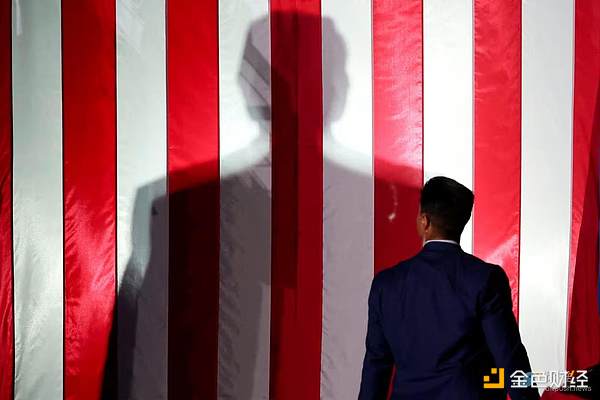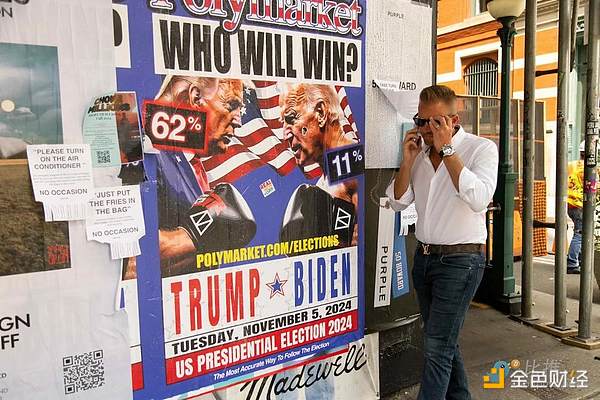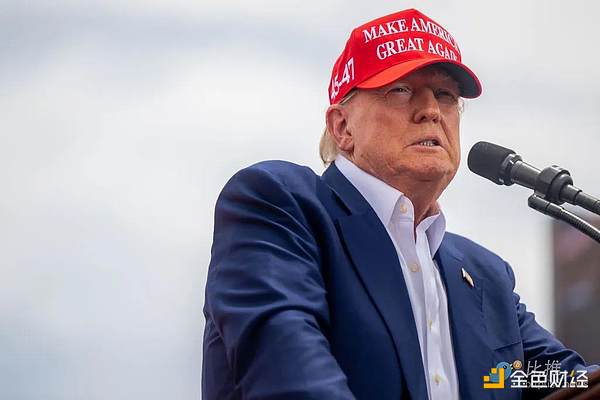Source: Wall Street Journal; Compiled by BitpushNews Mary Liu
The man who bet more than $30 million on Donald Trump's victory wants to tell people that he is not trying to manipulate the US election.
"My purpose is just to make money," the man who calls himself Théo said in a Zoom call with a Wall Street Journal reporter earlier this week. Théo claims to be a Frenchman who lived in the United States and worked as a trader at a bank.

Last month, The Wall Street Journal reported that four accounts on the Polymarket platform had been systematically buying contracts betting on Trump's victory.
As shown on Polymarket, the bets increased Trump's odds of defeating Vice President Kamala Harris. Blockchain data showed that the accounts were all funded by the same cryptocurrency exchange, sparking debate about the motives of the "Trump whale" behind them.
Last week, New York-based Polymarket said it had contacted the "Trump whale" as part of its investigation into the bets. The person behind the bet is a French national with extensive trading experience and a background in financial services, the company said.
"As a result of our investigation, we have learned that this individual's investment behavior was based entirely on his personal predictions of the election results," Polymarket said in a statement.
The details in the Polymarket statement are consistent with Théo's self-description. He confirmed that he had spoken to a member of Polymarket's legal and compliance team.
Election observers are poring over all the data to try to predict the outcome of one of the most controversial and seemingly closest US presidential elections ever. Prediction markets, which allow people to bet on a variety of potential events, have become a possible way to predict the winner of an election. Historical studies have shown that the presidential candidate with the highest odds in the betting market before Election Day tends to win the White House.
The emergence of the Trump whale, however, exposes the limitations of today’s prediction markets: While volume on Polymarket has surged this year, it’s still too small for a wealthy, opinionated individual to manipulate prices with multimillion-dollar bets.

After the Oct. 18 article about his bet was published, Théo emailed the Journal. To prove he was behind the Polymarket bet, the Journal asked him to place a bet on “whether Taylor Swift will announce her pregnancy in 2024” — one of many small, nonpolitical bets on the platform. Minutes later, Polymarket’s website showed that one of the four accounts, Theo4, had placed a small bet on Swift’s pregnancy.
On the Zoom call, Théo wore a gray Nike sweater and a short, neatly trimmed beard. Speaking in lightly accented English, he said he made the bet after concluding that polls underestimated Trump’s approval rating, and he denied speculation that his bet was intended to boost Trump’s support.
Théo declined to give his real name, and the Journal could not confirm all the details of his story. Although Théo said he funded the bet with his own money, it was impossible to confirm that was true. The Journal also could not rule out ties between Théo and any political organizations or Trump allies.
“I have absolutely no political intentions,” Théo wrote in his first email.
Théo said he did not want to reveal his name because his friends and children do not know the amount of his wealth and he does not want them to know about his bet on Trump. He describes himself as a veteran financial investor who is willing to risk tens of millions of dollars on high-conviction trades. But Théo said political betting is still new to him.
Théo said he became interested in US polling data earlier this year. He observed that many polls underestimated Trump's support in 2016 and 2020, and concluded that if Trump performed well again this year, he would beat Harris. Théo also mentioned the "shy Trump voter effect" - people are reluctant to tell pollsters that they support Trump.
"I know a lot of Americans who will vote for Trump, but they won't tell you," Théo said. Asked about changes pollsters had made to their methodology to address problems in 2016 and 2020, Théo was dismissive, saying he had “not seen any substantive changes.”

In two weeks, Théo sent dozens of emails to Wall Street Journal reporters.
In many of the emails, he criticized mainstream media polls for favoring Harris. In Zoom calls, he claimed that Democratic media organizations had fanned expectations of a close race, rather than the sweeping victory he expected for Trump, setting the stage for social unrest.
Théo said he was caught off guard by the attention his trades attracted. In August, he quietly began betting millions of dollars against Trump using an account with the username Fredi9999. At the time, Trump and Harris had roughly equal odds on Polymarket.
Théo spread his bets over days and weeks to avoid causing price spikes. As his bets increased, though, Théo noticed that other traders stopped quoting when Fredi9999 bought. That made it harder for Théo to get attractive prices. Théo said he created three other accounts in September and October to mask his purchases.
Now, if Théo all his expectations of a really Trump win all come true, he could have more than his investment.
In addition to his main bet on Trump winning the Electoral College, Théo also made millions of his popular votes—which many political observations are unlikely to happen, as on Trump carries Pennsylvania, Michigan, and Wisconsin, the single state.
If Harris wins, Théo will lose most of his $30 million, which he said is the large of his available capital.
Together, the four “Trump whale” accounts hold about 25% of the bets on Trump winning the Electoral College and more than 40% of the bets on Trump winning the popular vote, according to data provider Polymarket Analytics.
The Frenchman admitted to feeling nervous. He expressed confidence that Trump will win — estimating his chances of winning the election at 80% to 90% — but he also worried that his bets could be disrupted by last-minute surprises.
“There are always surprises,” Théo said.
 Alex
Alex
 Alex
Alex Miyuki
Miyuki Weiliang
Weiliang Weatherly
Weatherly Alex
Alex Alex
Alex Miyuki
Miyuki Catherine
Catherine Weiliang
Weiliang Anais
Anais